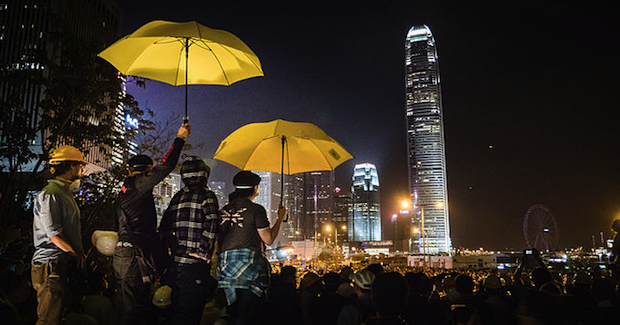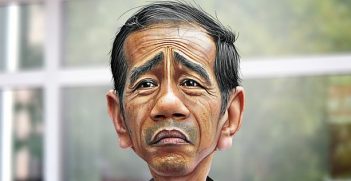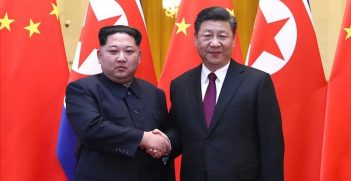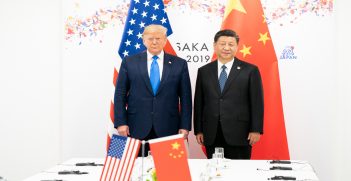Is Hong Kong Finished?

Can China be trusted to keep its written promises on Hong Kong? More precisely, can President Xi Jinping, chairman of the Communist Party of the People’s Republic of China, be trusted to honour his country’s legal obligations?
These are not academic questions, unlike the much-debated but as yet hypothetical issue posed by Professor Hugh White that Australia might have to choose between its ANZUS treaty security partner, the United States, and its main trading partner, China.
The issue is about China’s breaches of the Sino-British Agreement that returned Hong Kong to Chinese sovereignty almost 20 years ago. The breaches—and apprehensions about the former British colony’s future under the ‘one country, two systems’ concept— were highlighted in visits to Canberra and Sydney last week by two prominent former members of the Hong Kong Legislative Council, Anson Chan and Martin Lee.
Ms Chan and Mr Lee attended a joint Australian Institute of International Affairs-Sydney Democracy Network meeting just one day after the swearing-in ceremony of the Hong Kong legislature—of which they were both members—descended into farce as newly elected pro-democracy lawmakers caused uproar. At the meeting, Mr Lee, the founding chairman of the Hong Kong Democratic Party and a leading lawyer, insisted that Beijing is reneging on its obligations.
Ms Chan, second-in-command under the last British governor of Hong Kong, Chris Patten, and also for the first Chief Executive under Chinese sovereignty, C.H. Tung, was even more forthright. She claimed China has planted agents to break the law, that morale in the highly efficient and highly principled civil service had declined badly as a result of Beijing’s political appointments, and that the freedom of the press has evaporated.
“If you look at public confidence in Hong Kong’s media today, it has sunk to a 10-year low”, she said. The Press Freedom Index of Reporters Sans Frontières shows Hong Kong has fallen from 18th in 2002 to 69th today, she said.
The Hong Kong lawmakers are not alone. Britain’s foreign secretary, Boris Johnson, while on a visit to Beijing with a trade delegation last week, said the UK had concerns about the rule of law in Hong Kong being broken by Chinese officials. Johnson cited the case of five booksellers who disappeared in late 2015, and later re-emerged in mainland China. One bookseller who returned to Hong Kong described how he was kept in solitary confinement for months. The foreign secretary said this was “a serious breach of the Sino-British Joint Declaration by undermining the ‘one country, two systems’ principle‘.” Predictably, Chinese authorities reacted angrily, saying London “should stop meddling in China’s internal issues”.
It is clear that China is breaking both the words and the spirit of the agreement.
It is worth reminding ourselves of the relevant clauses.
Under the Sino-British Declaration, a binding international agreement forged by China’s Chairman Deng Xiaoping and British Prime Minister Margaret Thatcher, the Special Administrative Region of Hong Kong would retain many of its traditional freedoms for 50 years after the handover in 1997. It states Hong Kong will “enjoy a high degree of autonomy, except in defence and foreign affairs”.
It also states that Hong Kong law will remain basically unchanged from British rule, with an independent judiciary, and that the state would retain the right of final adjudication. It allowed British and other foreign nationals to be employed as consultants, and, in some cases, in the public service. Especially significant is clause (5) on Hong Kong lifestyle under Chinese sovereignty:
“The current social and economic systems in Hong Kong will remain unchanged, and so will the lifestyle. Rights and freedoms, including those of the person, of speech, of the press, of assembly, of association, of travel, of movement, of correspondence, of strike, of choice of occupation, of academic research and of religious belief will be ensured by law in the Hong Kong Special Administrative Region. Private property, ownership of enterprises, legitimate right of inheritance and foreign investment will be protected by law.”
Mr Lee and Ms Chan, who met with Foreign Minister Julie Bishop while in Canberra, are hoping Australia will speak up in support of Hong Kong. There is a good reason for Canberra to do so. It is one that seems to have bypassed most politicians, even those who claim an interest in international affairs. There are almost 100,000 Australian expatriates living and working in the city, plus about 500 Australian companies with regional headquarters in the territory, and a further 2000 with representative offices.
Despite their deep concerns, both Ms Chan and Mr Lee are cautiously optimistic that Beijing can be subtly persuaded to allow Hong Kong to continue as was originally intended, although it will mean reversing recent intrusions into the rule of law. Mr Lee believes it is in Beijing’s interests to oversee Hong Kong as a live experiment in democracy, arguing that is why Deng Xiaoping supported it. “I am hoping that Xi Jinping will do what Deng Xiaoping promised. If not, Hong Kong is finished.”
A film has already been produced presenting a dystopian view of Hong Kong’s future under China. Ten Years reveals the fears of families living under Chinese rule and won best picture in the Hong Kong film awards in April, a fact not reported on the mainland as the authorities promptly banned it. After a few showings in Hong Kong it also vanished from the screens.
But other seasoned observers are not so sure. Robert Fisk, the distinguished British war correspondent, arriving in Hong Kong from the turbulent, blood-soaked Middle East, last week asked, “What are these people complaining about? Surely Hong Kong’s freedoms are as essential to Peking as authoritarianism is to mainland China. Why would anyone mess with this post-colonial Shangri-La when its banks and Western businesses are turning it into a shop-front for communist China?”
But, he recalled, last year Leung Chun-Ying, Hong Kong’s chief executive said: “In the coming year [the Chinese Year of the Sheep, I hope that all people in Hong Kong will take inspiration from the sheep’s character and pull together in an accommodating manner to work for Hong Kong’s future.” That’s not so encouraging.
When I was a correspondent in Hong Kong in the sixties, working for the London Sunday Times at the height of Mao’s ‘great proletarian cultural revolution’, the focus of foreign journalists between frequent trips to South Vietnam was China-watching. A British intelligence officer taught me where to count the number of wagons rolling across the border into the New Territories—that would tell us whether the collective farms on the mainland were functioning. At weekends, we would gather in the Foreign Correspondents Club, give a generous number of $HK notes to local charities for each bottle of wine we drank, and sing, “we’re the China watchers of Hong Kong, we’re never ever wrong”. Nobody bothered much about whether the colony’s citizens had democracy—they didn’t.
Spool forward almost 50 years, now in the age of 30-second videos on TV news, Twitter and Facebook, and it’s easy for the protesters to attract attention and annoy Beijing. Power in Hong Kong now lies with the international banks that occupy gleaming glass and steel tower blocks. HSBC—the Hong Kong and Shanghai Bank—like many of its competitors has a bet each way with offices in Shanghai as well. Until 2047 draws closer, it seems to me, that is how it will remain.
Colin Chapman is a writer, broadcaster and public speaker, who specialises in geopolitics, international economics, and global media issues. He is also the immediate past president of the AIIA in NSW.
This article is published under a Creative Commons Licence and may be republished with attribution.





